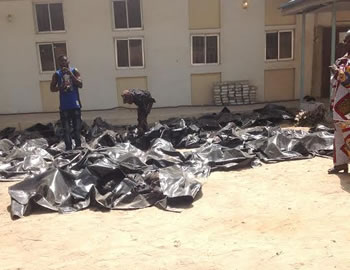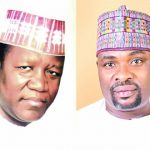While the country is yet to unravel the mystery behind the gruesome murder of Eunice Olawale, a female pastor in the Federal Capital Territory (FCT), some gruesome killings were reported in Plateau State on Monday. A 76-year-old first-class traditional ruler who had been on the throne since 1974, Saf Ron-Kulere, his police orderly, Inspector Sunday Wuyah, together with his wife and son, were waylaid by suspected Fulani herdsmen and mowed down while returning from the farm. The dastardly killing of the late monarch and chairman of the Bokkos Traditional Council, was reportedly carried out in Sha village in Bokkos Local Government Area.
The killing sparked off a protest by youths in the area, who burnt down Fulani settlements. Even though the leadership of Fulani herdsmen in the country absolved its members of blame in the brutal killings, natives of Bokkos insisted that they were indeed culpable, and that the killings were a fallout of the protracted battle over grazing reserves in the area. According to Solomon Maren, the member representing the Bokkos/Mangu Federal Constituency in the House of Representatives, such conscienceless killings had persisted in the area since January this year. Maren noted that the village head of Makayi and the district head of Manguna were killed in similar circumstances, apparently without justice being done. Senator Joshua Dariye, a former governor of the state and native of Bokkos who represents the Plateau Central Senatorial District in the National Assembly, also expressed indignation. Ironically, Saf, who was said to be the symbol of harmonious co-existence among the natives and other ethnic groups in the area, was murdered in cold blood, along with his family members.
Naturally, eminent and well-meaning Nigerians including the Sultan of Sokoto, Alhaji Sa’aad Abubakar III, have roundly condemned the latest development. The Sultan described the incident as barbaric, calling for concerted efforts to fish out the perpetrators. However, the protracted killings in Plateau State require deeper reflection and a coordinated programme of action. If anything, it can be said with certainty that the prevailing peace in the area is that of the graveyard. The authorities have shirked their responsibility to resolve the riddle surrounding previous killings in similar circumstances. They pretend that all is well when, in reality, there is much to be afraid of in the belly of time. Justice and peace are intertwined in the affairs of people and nations. Neither can you guarantee peace where nepotism and mutual suspicion reign supreme.
Therefore, reassuring as the statement of the state government that it would collaborate with all peace-loving citizens of the state to ensure peace is, it must go beyond paying lip service to security of lives and property, especially the imposition of a curfew. The fundamental issues fuelling this savagery over time have not been addressed. Why have the authorities failed to arrest and bring to justice, those suspected to have been responsible for similar killings in the past? Government must act fast and rekindle public confidence. Otherwise, it might be inadvertently widening the propensity for the aggrieved to resort to self-help, with grave consequences.
Plateau, like Kano and Kaduna states, remains one of the hotbeds of ethno-religious conflicts in the country. Certainly, with thousands lost to sectarian violence since 1999, it will be a disservice to the nation if the blood-letting is not stopped. The latest dastardly act is sufficient to elicit serious apprehension and tension in a state that was once famed as a tourist destination in Nigeria.
The Plateau killings are not only callous and ungodly, they are indicative of the maniacal disposition of certain individuals who are bent on setting the whole country permanently on the edge, security-wise. The gun-wielding herdsmen have continued to hold the country by the jugular, especially in Benue, Nasarawa, Enugu and, lately, Ebonyi State. Having been committing murder with reckless abandon, they should be made to pay the supreme price based on the law of the land. The blood of the innocent requires no less.






